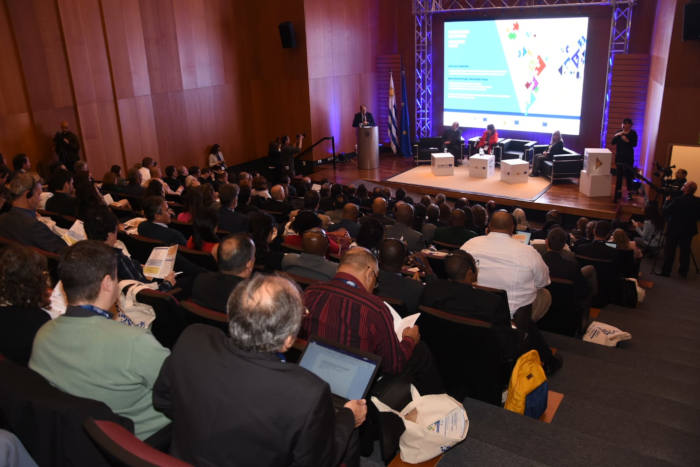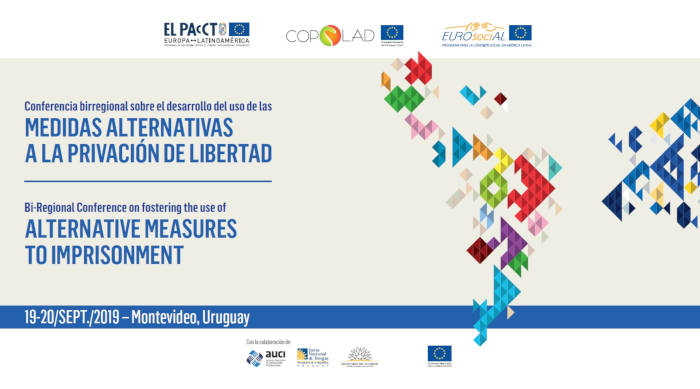-
19 September 2019
Category : Opinion
COPOLAD, EL PAcCTO, EUROsociAL+ and the value of joint work in Latin America and the Caribbean
These projects, financed by the European Union and in whose management the FIIAPP participates, hold a high-level bi-regional conference today in Montevideo on alternative measures to the deprivation of liberty
 Snapshot taken at the beginning of the conference
Snapshot taken at the beginning of the conferenceWith the presence of numerous European and Latin American authorities, COPOLAD, EL PAcCTO and EUROsociAL+ combine efforts, work, discourse and media in this conference with the aim of achieving a greater impact of the issue on society.
The conference was closed with a broad agreement formalised in a joint declaration ratified by all the representatives of the participating Latin American and Caribbean countries, as well as by the European Union and by the three regional cooperation programmes organising the event: COPOLAD II, THE COURT and EUROsociAL+.
Each from its perspective, in this post the three projects highlight the common dimension that they share around alternative measures to imprisonment.
COPOLAD and the importance of coordination between institutions
In recent years, several alternative measures to prison have shown encouraging results by reducing, in some prisons, the overpopulation and with it, the problems associated with this situation. The lecture will explain the main lines of action in this area, which have shown positive results, consistently and in different social contexts, in relation to overcrowding and in addressing other associated problems. In this context, and in order to explore the successful alternatives implemented in some countries and the evaluation of their benefits, an aspect that is common, basic and essential for ensuring success in the application of any alternative measure will be considered.
This key factor is the need for inter-institutional coordination, a concept that is easy to formulate but more complex to apply. Inter-institutional coordination has proven to be at the centre of any action that promotes the development of public policies in the field of alternatives to prison if they are to be effective (evidence-based), efficient and aligned with development goals, especially the protection of human rights, the empowerment of women, the promotion of public health and good governance.
With this in mind, the conference will provide an opportunity to look more in-depth at what inter-institutional coordination means in this area, the implications of facing the many challenges of developing and managing opportunities and the coordination mechanisms (multisectoral platforms and tools) that must exist to improve horizontal cooperation between the judicial system and the security forces, as well as between social and healthcare services.
Teresa Salvador-Llivina is director of COPOLAD and Claudia Liebers is responsible for Institutional Relations and Project Strategy.
EL PAcCTO: the relationship between alternative measures to prison and organised crime
Worldwide, and Latin America is no exception, many states have a prison overpopulation that sometimes reaches alarming levels. Overcrowding is an evil in itself, since in addition to affecting the human dignity of persons deprived of liberty, it prevents or greatly complicates the correct implementation of social reintegration programmes, the physical separation between dangerous detainees and minor criminals or first-time offenders.
Numerous international studies underline that prison cannot be the only solution for dealing with crime and show that, frequently, it becomes a crime school, favouring the proliferation of criminal groups that act inside and outside the detention centres, putting the safety of convicts and society as a whole at risk. There are several criminal organisations that have emerged and have been strengthened in the prison environment, taking advantage of the weaknesses of the systems due to high overpopulation.
Therefore, one of the main concerns of EL PAcCTO is the need to support the execution and use of alternative measures to deprivation of liberty, considering them as essential to easing congestion in prison systems and focusing attention on the most dangerous persons deprived of their liberty, who can recruit followers in prisons. For these reasons, we consider that the measures are also an essential tool for the fight against organised crime.
In addition, alternative measures are a transversal issue that need a holistic approach, strong coordination and lead to cultural change and a shared approach among all the actors involved also in terms of external communication.
Giovanni Tartaglia Polcini is the coordinator of the EL PAcCTO Prison systems component, Lorenzo Tordelli is the thematic co-coordinator-manager and Nathalie Boissou is the deputy coordinator.
EUROsociAL + , favouring social insertion and the abandoning of crime
In Montevideo, the EUROsociAL+ programmes, together with El PACcTO and COPOLAD, are currently organising a bi-regional conference on alternative measures to deprivation of liberty. All three, each from its own perspective, have addressed this issue, converging on common problems that make us work in the same direction.
Imprisonment as a penalty, which should be a last resort, has been used indiscriminately in Latin America. There has been an exponential growth in the prison population in recent decades. This overpopulation, which has caused problems of overcrowding, health, and violence, has been questioned to the extent that it has shown not to be able to favour social insertion processes, nor has it had a deterrent effect reducing re-offending, or positive effects on social rehabilitation
The social cohesion approach, which the EUROsociAL+ programme promotes, is closely linked to the development and use of alternative measures to deprivation of liberty, not only because inequality contributes to violence, and this in a programme that aims to reduce all kinds of inequalities, but because in their eagerness to “leave no-one behind”, the question that should interest us above all is not why do criminals commit crimes? but why do they stop committing crimes? The search for actions that favour the decision to abandon crime is the key in the processes of social insertion of offenders and in alternative measures.
A special focus will be given to women deprived of their liberty in this conference. Despite the fact that the percentage is much lower than that of men, the number of women imprisoned in the region has almost tripled in recent decades. This growth is very fast and proportionally much higher than that of men. These trends should be a concern for governments and the prison system, still lacking or indifferent in dealing with the specific needs of women. It is urgent, therefore, to incorporate the gender perspective.
Of course, the application of alternative measures cannot be incorporated without the backing of reliable administrative action. Implementation requires a framework of action with rehabilitative measures that allow judges to give real consideration and offenders to take responsibility for their actions and change and abandon crime.
Sonia González Fuentes is coordinator of the Democratic Governance policy area of EUROsociAL+ at FIIAPP.

The views and opinions expressed in this blog are the sole responsibility of the person who write them.




